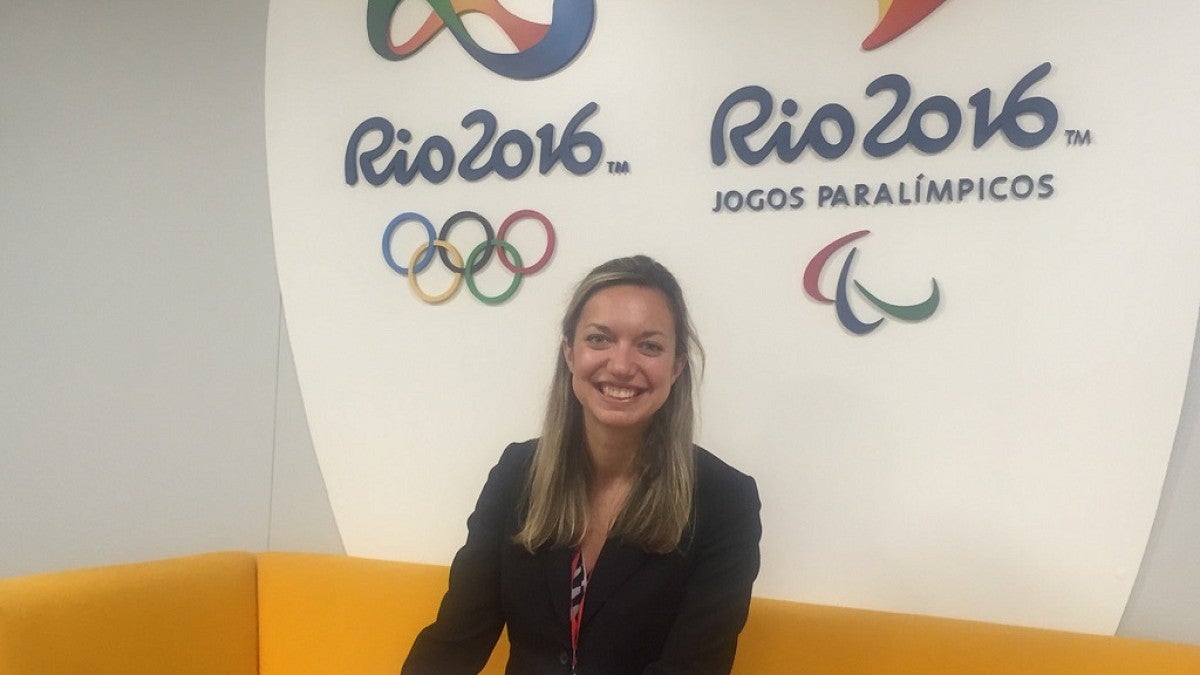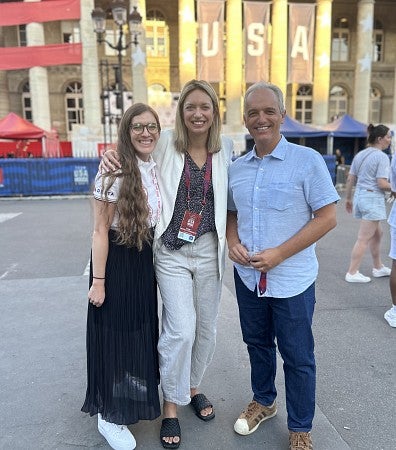
May 12, 2025 - 3:00pm
Hayward Field has long been one way that Ducks punch their tickets to join Team USA. But College of Arts and Sciences alumna Kara Buckley (sports marketing, Spanish, ’06) found language learning as her way to join the US Olympic team, though you won’t see her competing.
Buckley works as a senior advisor to the US Olympic and Paralympic Team. She consults on sponsorship and marketing and is helping prepare for the 2026 Winter Olympics in Milan-Cortina, Italy. She also serves on the Charles H. Lundquist College of Business’s Board of Advisors. What Buckley learned while studying Spanish—both the language itself and the process of learning a language—has helped her advance her career.
“Spanish was just always a love of mine, tied to a love of learning languages and studying abroad,” she said. “I was able to pursue a career that combined both of those interests, and it also led me to learning more languages. I learned Portuguese after college, but it really came from the foundation of language learning from the university work in Spanish.”
Why did you want to study a language?
My mom was from the Netherlands, and she went to the University of Oregon. She speaks four languages, and she studied Spanish and German at the UO. I grew up around kind of very international family and a love of languages. Starting in high school, she supported my interest in studying abroad. I studied abroad twice in Spain in high school, and once in Chile when I was at the UO. That made such a difference.
Being able to study abroad to learn a language makes you acclimate quickly. Do you have memorable moments while in Chile?
It took a few weeks to adjust. All my courses were in Spanish, so that was a little overwhelming. At first it was full on immersion. And this is back in the days of dial up internet, so I was pretty disconnected from the English-speaking world. After a few weeks of making some friends and doing everything in Spanish, it started to click.

Studying a language means being immersed in a culture. What attached you to Spanish as a student?
One of my classes was about film history, so we’d watch famous Spanish films. And going out at night with my friends to different shows—all of that led to an enriching experience. Eventually, I was reading poetry and analyzing poetry for a course on Chilean poetry. It all made for a deeper, richer appreciation for the language, and I could express myself differently than I could in English.
There’s so much more to learning a language. You’re opening up to different cultures. You're finding more ways to express yourself more authentically.
That makes me think of this singer—about 20 years ago—named Juanes. He was popular at the time, and he had this song [“Nada Valgo sin Tu Amor”], and these lyrics that almost became like my mantra: “Porque nada valgo, porque nada tengo, si no tengo lo mejor.” In English it’s, “I’m not worth anything, I don't have anything, unless I have the best.”
It’s a song about romance, right? But to me, it was: I will do the best I can, and I want the best opportunities and career paths. I’d say I had never thought this way before. Those lyrics were a big driver for me as I thought about what I wanted to work on.
Learning a language can be uncomfortable. How have you gone through the process of learning a language and how did that help you grow as a person?
With language learning—and maybe this is an American thing—you're almost expected to be bad, especially in the beginning. But it gave me some permission to make mistakes.
For example, I spent seven years learning Portuguese after college. Twice a week I would meet with a teacher. I could barely say anything in the beginning, and by the end, I was leading presentations in Brazil in Portuguese.
But I would try to skirt around words. When I was working at Visa, I remember giving a presentation, and I couldn't remember the word for wallet in Portuguese. So I described it as, “Everybody has the same thing in their pants.”
And everybody laughed.
As an American, I was making an effort that most Americans don't make, and I was really trying to learn their native language. Even in those moments, I had blunders, but I think it was seen as endearing.
How has language learning benefitted your career?
I got my first promotion because I spoke Spanish. I remember raising my hand to say, I want to work more on international projects. And this was at a sports marketing agency called Octagon. They wanted somebody who could go to Madrid, Barcelona and Mexico City to run these programs for hospitality guests at these amazing events, such as the Union of European Football Associations (UEFA) Champions League and concerts.
Not only was I able to say I can speak Spanish, but I can write in Spanish and read in Spanish. I was able to design a whole program for Spanish-speaking guests. Other people were up for the similar role, but didn't quite get the opportunity because of the language skills.
I got another big promotion when I was working at Visa. I was working at first on the World Cup in Brazil in 2014 and then I got a promotion to work on the to work on the Olympics and the Paralympics in 2016. And for twice a week for seven years total, I studied Portuguese, including all five years I was at Visa. I had a learning stipend, so I found a teacher to come and teach me. And then I organized it for the whole team.
People saw me so dedicated to language learning and bringing a Portuguese teacher to the office so we could go and practice Portuguese. That gave me a huge opportunity to get promoted again for that Olympics and Paralympics job. Languages have been so critical in my career.
— By Henry Houston, College of Arts and Sciences
